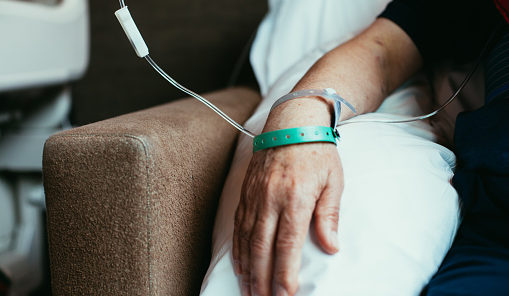Data on durable efficacy of two investigational chemotherapy-free treatments for non-small cell lung cancer (NSCLC) or chronic lymphocytic leukemia (CLL) will be presented at the upcoming American Society of Clinical Oncology (ASCO) 2021 Annual Meeting.
Amivantamab in Chemotherapy-Naïve NSCLC
In the phase 1 CHRYSALIS study, treatment with amivantamab in combination with lazertinib spurred a durable response in chemotherapy-naïve patients with NSCLC and epidermal growth factor receptor (EGFR) exon 19 deletion or L858R mutations, whose disease progressed after treatment with osimertinib. Forty-five patients received amivanatab 1050mg or 1400mg (depending on body weight) in combination with lazertinib 240mg. Thirty-six percent of patients responded to treatment, with 15 patients achieving a partial response and one patient achieving a complete response (CR). The median duration of response was 9.6 months (95% confidence interval [CI], 5.3–not reached). More than two-thirds of patients (69%) had a duration of response of greater than six months.
Median progression-free survival (PFS) was 4.9 months (95% CI, 3.7–9.5). The clinical benefit response rate was 64% (95% CI, 49–78). The most common adverse events (AEs) were infusion-related reactions (78%); acneiform dermatitis (51%); rash (27%); and paronychia (49%). Grade ≥3 AEs occurred in 16% of patients, which led to dose discontinuations in 18% and treatment discontinuation in 4% of patients with serious AEs.
“Typically, patients whose disease no longer responds to osimertinib therapy would have little opportunity to seek additional treatments, other than chemotherapy. However, the durable responses we are seeing with the combination of amivantamab and lazertinib suggest an additional targeted option may be possible,” said lead investigator Byoung Chul Cho, MD, PhD, from the Yonsei Cancer Center in Seoul, South Korea, in a press release.
Durable PFS with All-Oral Ibrutinib Regimen
Two studies featured at ASCO 2021 will highlight efficacy of ibrutinib for previously untreated CLL, including the phase 2 CAPTIVATE study. In total, 159 patients aged >70 years with CLL received three months of oral ibrutinib as monotherapy, followed by 12 months of ibrutinib in combination with oral venetoclax. More than 90% of patients completed all cycles of this combination regimen.
After median follow-up of 27.9 months, the overall response rate (ORR) 96%. More than half of patients (56%) achieved a complete response (CR; 95% CI, 48–64)—this was consistent even among patients with high-risk disease. Eighty-nine percent of patients who achieved a CR maintained this response for at least one year. The estimated rate of 24-month PFS was 97% and 93% for patients with and without mutated immunoglobulin heavy chain variable (IGHV), respectively, and 24-month overall survival (OS) was 98%. MRD negativity was achieved in 77% and 60% of patients with peripheral blood and bone marrow, respectively.
“The latest data from the CAPTIVATE study underscore that [ibrutinib] in an all-oral fixed-duration combination with venetoclax also delivers a high rate of progression-free survival at two years while enabling treatment-free remission for patients,” said principal investigator Paolo Ghia, MD, PhD, Professor of Medical Oncology at the Università Vita-Salute San Raffaele, Italy, via a press release.
Long-Term Benefit of Ibrutinib Monotherapy in Untreated CLL
A second study regarding ibrutinib for CLL to be featured at ASCO is RESONATE-2, which evaluated the long-term outcomes of continuous ibrutinib as a single-agent for untreated CLL. This trial enrolled 269 patients aged ≥65 years, who were randomly assigned to 12 cycles of either ibrutinib or chlorambucil and followed for up to seven years.
After 6.5 years, the OS for patients who received ibrutinib monotherapy was 78% and median PFS had not yet been reached. Sixty-one of the ibrutinib group were alive and free of progressive disease at 6.5 years, compared to 9% of patients who received chlorambucil. The PFS hazard ratio for ibrutinib was 0.160 (95% CI, 0.111–0.230) and this benefit was consistent in patients with high-risk disease. At the most recent follow-up, the CR rate with ibrutinib was 34%, and nearly half of patients remain on treatment after seven years. Ibrutinib was well-tolerated with low rates of grade ≥3 AEs. Three percent of patients (n = 2) discontinued treatment due to AEs from years five to six, and there were no discontinuations between years six and seven.
“The results from RESONATE-2 further support the long-term benefit of [ibrutinib] monotherapy in front line CLL for which the breadth and maturity of data continue to grow in support of this standard-of-care treatment and its impact on progression-free and overall survival,” said Craig Tendler, MD, Vice President of Clinical Development and Global Medical Affairs, Oncology, Janssen Research & Development, LLC.
Credit: Original article published here.










